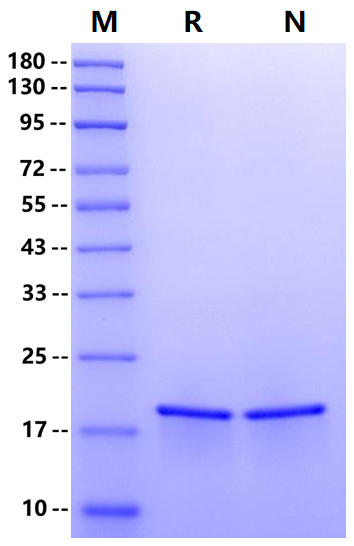2μg (R: reducing condition, N: non-reducing condition).
Product Details
Product Details
Product Specification
| Species | Human |
| Antigen | GABARAPLI |
| Synonyms | Early estrogen-regulated protein,GABA(A) receptor-associated protein-like 1,Glandular epithelial cell protein 1 (GEC-1) |
| Accession | Q9H0R8 |
| Amino Acid Sequence | Met1-Lys117, with N-terminal 8*His Tag |
| Expression System | E.coli |
| Molecular Weight | 22kDa |
| Purity | >95% by SDS-PAGE |
| Endotoxin | <0.1EU/μg |
| Conjugation | Unconjugated |
| Tag | His Tag |
| Physical Appearance | Lyophilized powder |
| Storage Buffer | PBS, pH7.4 |
| Reconstitution | Reconstitute at 0.1-1 mg/ml according to the size in ultrapure water after rapid centrifugation. |
| Stability & Storage |
· 12 months from date of receipt, lyophilized powder stored at -20 to -80℃. · 3 months, -20 to -80℃ under sterile conditions after reconstitution. · 1 week, 2 to 8℃ under sterile conditions after reconstitution. · Please avoid repeated freeze-thaw cycles. |
| Reference | 1. Ohsumi Y, et al. (2004) The crystal structure of microtubule-associated protein light chain 3, a mammalian homologue of Saccharomyces cerevisiae Atg8. Genes Cells. 9(7):611-8. 2. Geng J, et al. (2008) The Atg8 and Atg12 ubiquitin-like conjugation systems in macroautophagy. 'Protein modifications: beyond the usual suspects' review series. EMBO Rep. 9(9):859-644. 3. Suzuki NN, et al. (2005) The crystal structure of plant ATG12 and its biological implication in autophagy. Autophagy. 1(2):119-126. |
Background
ATG8, also known as GABARAPL1, is a ubiquitin-like protein that has a crystal structure. ATG8 consists of a 5-stranded β-sheet, which is enclosed by two α-helices at one side and one α-helix at the other side and exhibits a conserved GABARAP domain. It functions in the formation of autophagosomal membranes. The transient conjugation of ATG8 to the autophagosomal membrane through a ubiquitin-like conjugation system is essential for autophagy in eukaryotes. Autophagy is induced upon nutrient depletion or rapamycin treatment and leads to the response of more than 30 autophagy-related (ATG) genes known so far, including ATG8.
Picture
Picture
SDS-PAGE



